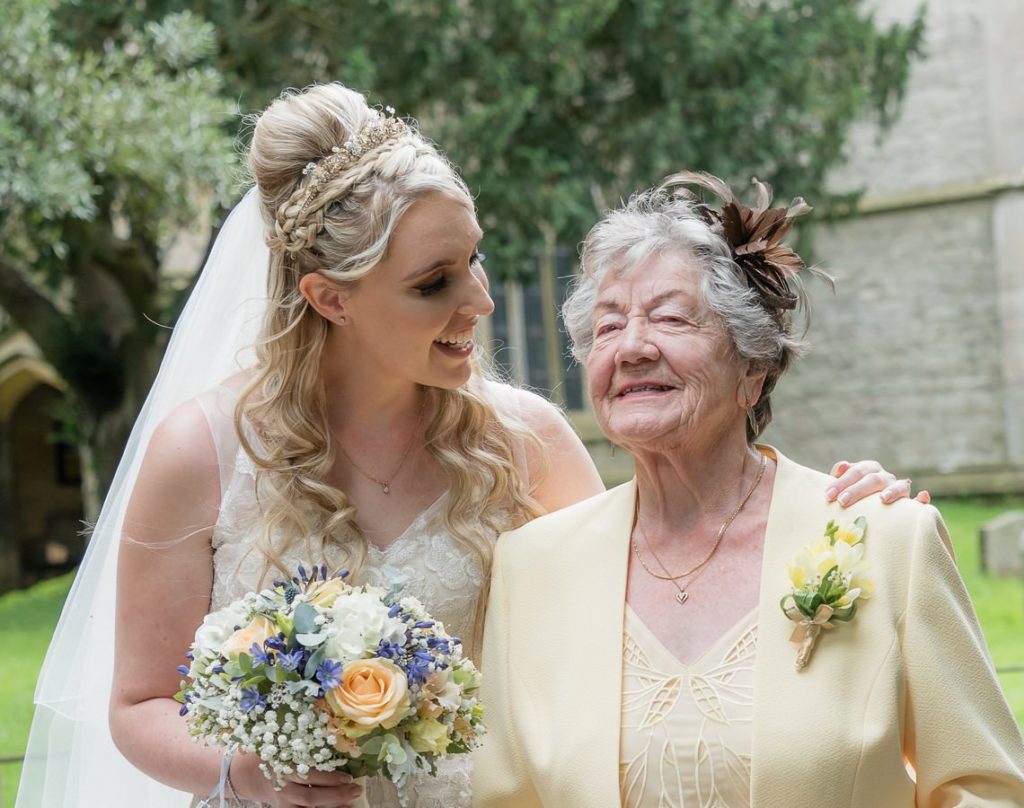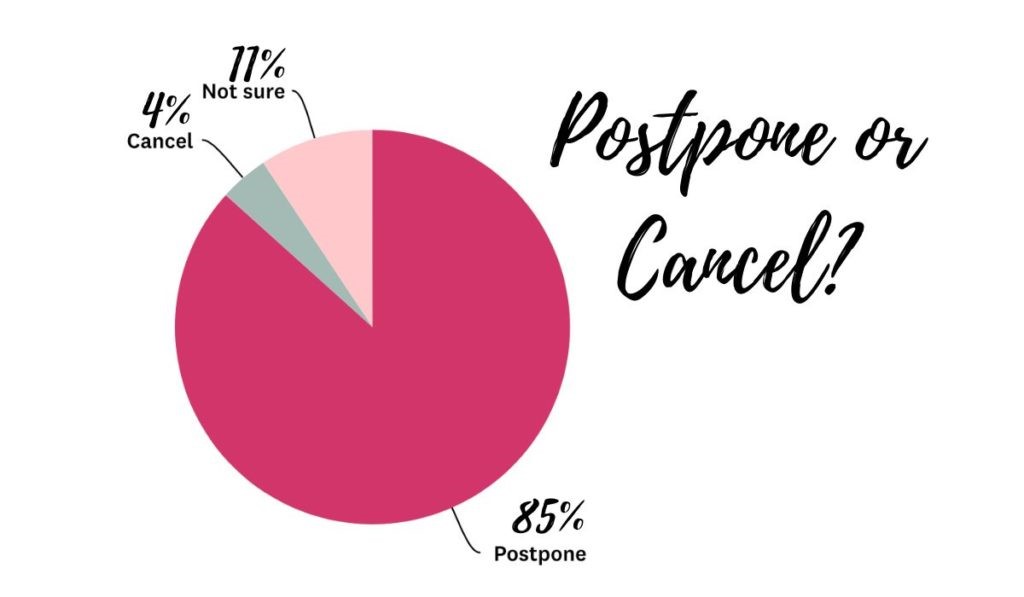
If you have planned your wedding for 2020, there is little doubt that coronavirus will affect your wedding, the only question has been “how much”? Two weeks after social distancing was introduced, and as venues and suppliers put contingency plans into action, we have all the information you need on postponement, cancellations and insurance.
What’s currently happening with weddings?
During lockdown
Weddings due to take place from 24th March to 14th April had to be cancelled under the government’s lockdown, with absolutely no weddings taking place during that time.
There has just been another 3 weeks lockdown announced at the time of writing . This will last until the7th of May , and the same rules apply.
During social distancing
Once the lockdown is lifted, recommendations for social distancing will be in place until at least mid June. Weddings are social events and most venues have made the decision to postpone all weddings due to take place during this period of social distancing.
Can we still get married during social distancing?
Most venues took the decision to close and postpone weddings in May and June in order to protect guests and their own teams. Registrars and clergy are also needing to focus their time on funerals.
It is not yet clear when weddings will legally be permitted again. While social distancing is still in place, most couples won’t feel comfortable with going ahead with their wedding plans. For any weddings that do take place in this period, it is likely that the social distancing measures used immediately before lockdown will be in place. This will mean a limit of just the minimum legal attendees at the wedding; the officiants, the couple and two witnesses. It is unlikely that guests will be able to attend the actual ceremony.
When social distancing is relaxed
There will be a gradual return to normality, but weddings will still be impacted for some time. Vulnerable guests may still choose to isolate themselves. Travel restrictions may affect guests arriving from overseas. Some couples will run into challenges with their marriage documents; read on for more on that.
As things return to normal
Although weddings may return to normal as far as the couples and guests are concerned, we are already seeing a significant shortage of availability on Saturdays and popular dates. This demand could push prices up for new bookings.
Important information on marriage documents during Covid-19
For civil weddings and civil partnerships.
Registrars look after the legal documentation for most weddings. They also oversee documentation relating to registering births and deaths. Understandably they will be prioritising issuing the paperwork to enable funerals to take place, as well as registering births. As they have limited staff for non essential administration, some districts will not be scheduling appointments to give notice of marriage or civil partnership for the foreseeable future.
If you are having a civil ceremony or civil partnership in an approved venue, are getting married in a Register Office or are having a religious wedding that requires you to “give notice”, you need do so with the Registrar a minimum of 29 days and a maximum of 365 days before the wedding can take place. If you haven’t already given notice, you may not be able to get the documentation you require for a legal marriage. This does not include Church of England weddings where notice is given through the reading of Banns.
For Church of England weddings
While church services aren’t being held, your Banns can’t be read. Banns are the equivalent of “giving notice”. In exceptional circumstances such as this, you will be able to apply for a Special Licence to marry from the Archbishop of Canterbury. If you can demonstrate that you have done all you can to comply with the requirements, their guidance suggests they will look at your application favourably.
In the same way, if you don’t already have a legal entitlement to marry in your church, you may have been planning to establish a “qualifying connection”. This is obtained through habitual attendance at that church for 6 consecutive months before the wedding. You can count online streamed church services as part of the 6 months, but only if you had both already started to attend before the church closed. You’ll need to recommence as soon as your church reopens. Again, if you have been unable to meet the criteria required you may be able to get a Special Licence.
If you can’t get your documents in time
This will be a reality for some couples. If you are faced with this situation there are three options:
- Postpone the wedding to a date you can get the documents required for a legal marriage
- Continue with the reception as planned, but postpone the legal marriage.
- Have a celebrant led ceremony. This is not a legally binding marriage so you’ll need to complete the legalities at another time, however a celebrant led ceremony allows you to exchange vows and rings in front of friends and family and can feel just like a wedding. As it is not a legal ceremony, you have total flexibility on where it takes place, including outside, and what it consists of.
Is your wedding likely to go ahead? Our month by month guide.
More than 600 couples with weddings in 2020 completed a survey run by Guides for Brides They have asked all suppliers to share the information they found as follows:
If your wedding is from April to June, it is unlikely that it will go ahead as planned. Venues are working hard to contact all their couples but it is a time consuming job. Especially for those choosing to phone each couple rather than deliver such difficult news by email. Most are starting by contacting couples with bookings in April, then May, then June.
If your wedding is in July or August, your venue and suppliers will thank you for waiting until they have contacted all those whose weddings have to be postponed before you contact them to discuss your intentions. In the meantime, the situation may be clearer from insurers. Plus, you may have more of an idea how much your wedding will be disrupted, if at all.
Most couples with weddings in September, October and beyond are continuing with their plans at this stage. Although, they should bear in mind that there will be a shortage of suppliers, as so many weddings are being moved to the autumn.
We have wedding insurance. Will we be covered?

If you are one of the 53% of couples with wedding insurance, you would usually have peace of mind that if your venue was closed, cancellation would be covered. Only 23% of those surveyed feel that it is likely that their insurance will settle their claim. The insurance companies are still in discussions with underwriters so we have been unable to get a clear answer so can only base advice on our own opinions.
Until you are absolutely certain your circumstances will be covered, you may decide it is best to keep your options open and leave cancelling until the last possible moment. By then there may be more clarity from insurance companies on what will and won’t be covered.
In the meantime, you may be able to get an alternative date temporarily “penciled in” either at your original venue or an alternative. The challenge is that the venue won’t want to hold a popular dates open for long, especially while other couples might need that date. However, insurance treats cancellation and postponement differently, and if you have already confirmed an alternative date your insurers may treat your claim as postponement, not cancellation.
Postpone or Cancel?
 In almost all cases, couples are postponing rather than cancelling, using the same venue and suppliers. After all, you are getting married for a reason and you chose your venue and suppliers for a reason. According to our survey of over 600 couples, only 4% have opted to cancel.
In almost all cases, couples are postponing rather than cancelling, using the same venue and suppliers. After all, you are getting married for a reason and you chose your venue and suppliers for a reason. According to our survey of over 600 couples, only 4% have opted to cancel.
Whether or not you have insurance would usually factor into this decision, as cancelling could mean forfeiting everything you have paid. You may also find you are legally liable for final balances still due. However, wedding insurance underwriters are still establishing what will and won’t be covered for cancellations and postponements relating to coronavirus so our advice would be to be cautious. Unless you have confirmation from your insurance company that your specific circumstances are covered, at this stage it is safer to assume you aren’t.
What are my postponement options?
Every venue has a different policy on postponing. Even venues within the same venue group have different policies from each other. This may seem unnecessarily confusing, but remember, it is incredibly unusual for weddings to be postponed. Venues understandably didn’t have policies in place to handle this unprecedented scale of disruption.
Most are using common sense deciding policies, rather than resorting to contracts and clauses. This seems the kindest solution for both parties, the couple and the venue, but needs compromise on both sides.
Some venues are offering couples any available dates to the end of 2020. Some are offering dates up to March 2021. Others are not putting a limit on the month or year but are restricting couples to midweek dates. Your options really depend on your venue, so make sure you are communicating with them about their contingency plans.
Our venue has closed but can’t offer us a convenient alternative date

Sadly, popular venues often require you to book two years ahead to secure a Saturday. So, many Saturday dates have already been secured for 2021 and 2022.
If this applies to you, check whether there are other venues within the same group that your venue can transfer your booking to. If not, you are probably being given the option of choosing a midweek date or a Sunday; or even waiting until 2023 for the next available Saturday.
If none of those options work for you, the only option is cancelling completely. That way you can book a venue that is available for the date you are looking for.
It is incredibly hard, but remember that your venue wanted your original wedding to go ahead on the date planned just as much as you did and everyone is trying to make things work in difficult circumstances.
If you have to cancel and rebook another venue
If it is important to you to get married on a particular date or day of the week, and your venue isn’t able to offer that date, your only option is to cancel and rebook. All venues will be busier than normal over the next 18 months so check there is another suitable venue with availability before making the final decision.
If you have wedding insurance and you are certain it will cover cancellation, book an alternative venue and cancel your original booking. This is not only the best solution for you, but also for your venue as they will still be paid for the original date.
If you don’t have insurance, minimising your losses will be a priority as your only option is to walk away from the original booking. You may still have final balances that you are legally liable for. If these balances directly relate to costs that won’t now be incurred, such as the cost of food, wine, waitresses and bar staff, talk to your venue to see if they’ll waive the final balance. If you don’t have insurance it is sensible to check your contract carefully; if they have voluntarily closed you may be in a better position to negotiate. The important point to remember is that at this stage no one knows the position the courts or insurers will take if there is a dispute, so it may be sensible to negotiate until you can reach a solution you are both comfortable with.
What should you do next? Practical steps.
After month’s of planning, if your wedding day is cancelled it can be soul-destroying to feel that you are back at the beginning of the planning process. Remember, you have already done most of the hard work. Once you’ve rescheduled your suppliers and checked your paperwork is in order, you are back where you were, and have extra time for the final touches.
- If you have made a firm decision to cancel your original date, let your venue and suppliers know, ideally by email. They can then release your date to another couple.
- Check that you will be able to get all the documents needed for your new date, taking registrar and church closures into consideration.
- Confirm your new date, ideally with a deposit. Some businesses are offering a Book with Confidence guarantee so that you won’t lose your deposit if your wedding is impacted by coronavirus a second time.
- Check your original suppliers are available for your new date and can still honour your booking. Any that are not available may be happy to transfer your booking to a trusted colleague or even a competitor. Suppliers are pulling together to help their couples any way they can.
- Book your registrar or church. You may not be able to do this for some time. Your wedding is incredibly important, but they may have even more important issues to focus on for now.
- Change the date on your online planner to your new wedding date. For added peace of mind, mark everyone you have booked in “My Suppliers” so you know we’ll be looking out for you in any way we can.
I cannot imagine how difficult it is for you, but remember, everyone will help where they possibly can.
If you have someone else as your photographer and they are struggling to offer you new dates I may be able provide back up for them. Find out a bit more about my wedding packages here. I’m happy to consider matching your current photographers package if they can’t give you your new date.
So don’t panic. Work the problems through and by all means Contact me here if you feel I can help.
COVID-19 and how it affected your wedding day will be a talking point for many years to come! A year no one is likely to forget! In the meantime keep safe, keep washing those hands. Look after your loved ones and let me know if I can be of any help at all. xx


